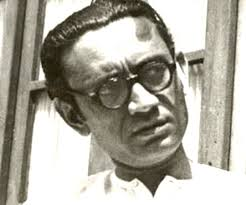"A writer picks up his pen only when his sensibility is hurt."
-- Manto to a court judge
$$ No one quite knows why Saadat Hasan Manto went away to Pakistan.
#Was it in a huff or on a whim? Was it to seek a better future, broken as he was by chronic drinking and acute poverty?
#Was it the thought of starting afresh, on a clean slate as it were, that attracted him whenever he did think of his wife and three daughters whom he loved dearly?
#Was it out of genuine disenchantment with the increasingly strident and communally charged atmosphere of the so-called bohemian film industry?
Or was it, as some suggest, the dream of owing an ‘allotted’ mansion the moment he crossed over?
(Naked Voices...collection of short stories)
"Why would I want to take the clothes off a society, civilisation and culture that is, in any case, naked? ...It is true I make an attempt to dress it- because it is not my job.....I never write on a black board with a black chalk.
# I always use a white chalk so that the blackness of the board is clearly visible." - Saadat Hasan Manto (11 May, 1912 - 18 January 1955)
Writing mainly in Urdu, he produced 22 collections of short stories, a novel, five series of radio plays, three collections of essays and two collections of personal sketches. His best short stories are held in high esteem by writers and critics.
He is best known for his stories about the partition of India, which he opposed, immediately following independence in 1947.
Manto was tried for obscenity six times; thrice before 1947 in British India, and thrice after independence in 1947 in Pakistan, but was never convicted.
He is acknowledged as one of the finest 20th century Urdu writers and is the subject of two biographical films: the 2015 film Manto, directed by Sarmad Khoosat and the 2018 film Manto, directed by Nandita Das.
Wikipedia says he received his early education at a Muslim High School at Amritsar where he twice failed his matriculation examination.
In 1931 he got admitted to the Hindu Sabha College but dropped out after first year due to poor results.
The big turning point in his life came in 1933, at age 21, when he met Abdul Bari Alig, a scholar and polemic writer who encouraged him to find his true talents and read Russian and French authors.
Bari also encouraged Manto to translate Victor Hugo's The Last Day of a Condemned Man into Urdu which was later published by Urdu Book Stall, Lahore as Sarguzasht-e-Aseer (A Prisoner's Story).
He then translated Oscar Wilde’s Vera into Urdu in 1934. He published his first original story in Urdu, Tamasha (Spectacle) under a pseudonym in Abdul Bari Alig’s Urdu newspaper Khalq (Creation). It was based on the Jallianwala Bagh massacre.
During this period he contributed to the daily newspaper Musawat, (Equality) and Ehsan (Kindness), both published from Amritsar. He also edited and translated Russian and French stories for the journals Alamgir and Humayun.






No comments:
Post a Comment